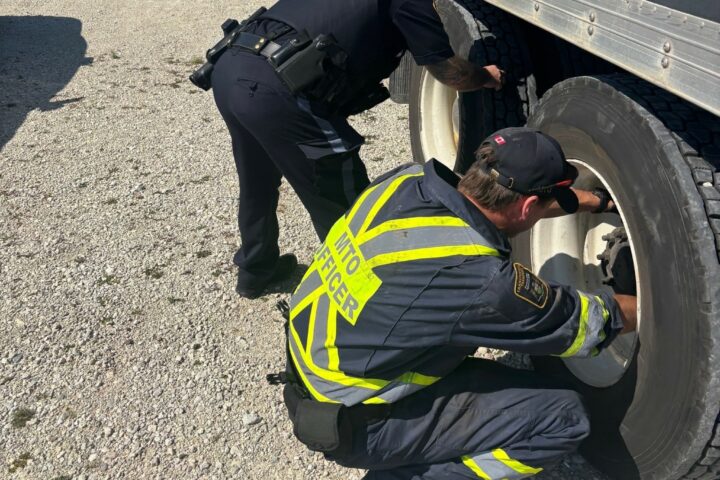Abuse of Canada’s Temporary Foreign Worker (TFW) program in the trucking industry is rampant, with the trucking industry accounting for more than 10% of violations and most monetary penalties going unpaid.
Those are the findings of a trucknews.com analysis of Government of Canada data on TFW program violations. We found there were 821 total violations of the program between 2020 and year-to-date 2025, with trucking companies accounting for 83 of those – slightly more than 10%.

There have been 17 violations so far this year, already matching last year’s total and on pace to surpass the 30 trucking violations seen in 2023. More than $2.481 million in monetary penalties have been levied against Canadian trucking companies for violations, but $1.277 million of that has been unpaid, with those carriers deemed ineligible to participate in the program.
That means 51.5% of the monetary penalties (by dollar value) have not been paid, while only 25 violators paid their penalties and 47 (65%) did not. The payment status of another 11 is unclear, as they were also handed lengthy bans.
Trucking companies in B.C. led with 26 violations, with Alberta on their heels with 25. By far, the most common violation was ‘The employer didn’t give the inspector the documents they asked for.’ However, collectively, trucking companies were guilty of 12 different violations under the program.
Some of the penalties are significant. The biggest penalty to a trucking company was a $258,000 fine and five-year ban assigned to a numbered Manitoba company. Brampton, Ont.-based Samhil Logistics was fined $100,000 and faced a 10-year ban from the program. A numbered Alberta company that operated as Bhau Transport was fined $152,250 and received a five-year ban. And Delta, B.C.-based Trans Empire Logistics was fined $135,000 and banned for 10 years.
The findings, according to Canadian Trucking Alliance (CTA) president Stephen Laskowski, underscore the need to refine the program.
“The whole system needs to be overhauled,” he said, when asked to respond to trucknews.com’s findings. “It doesn’t need to be ended; it needs to be overhauled.”
He wants to see vetting of carriers before they’re allowed to participate in the program, followed by ongoing audits (paid for by the carriers themselves) and an escalating scale of enforcement. Egregious violations should not only cause a carrier to lose its eligibility for the program, but the right to operate entirely, Laskowski added.
“How the heck are they allowed to continue to operate a commercial vehicle on our roads?” he blasted. “The government should be concerned. Everyone who sticks up for labor rights – including all unions – should be concerned about this. And the next question is, why are we allowing these companies to operate, period?”

Laskowski worries about knee-jerk reactions from lawmakers that could kill the TFW program outright, when it’s needed by the industry to attract longhaul drivers in times of labor shortages. “We need to fix it,” he said of the program, “because there are many fine fleets who rely on this program.”
Kentville, N.S.-based Eassons Transport is one of those fleets. Trevor Bent, CEO of Eassons, told trucknews.com the company began using the program – and other foreign worker programs – in 2012. The company has about 500 employees and 300 trucks operating across North America.
It has focused its sights on places like Europe, Jamaica, Trinidad and Tobago, and Dubai. In addition to developing a pipeline of foreign drivers, the program has allowed Eassons to diversify, providing many of the recruited foreign drivers with the chance to set down roots in Canada and become permanent residents. Some of those drivers have gone on to become owner-operators and business owners. In fact, three of the first four foreign workers Eassons brought to Canada in 2012 are still with the company today.

“It’s been a pretty rewarding experience in a lot of ways,” Bent said, noting about 70% of its drivers were recruited as foreign workers. However, Eassons takes a unique approach to the program. Rather than relying on sometimes-shady immigration consultants, it has its own team that visits the destinations from which it recruits in person. It conducts road tests and interviews in their home country, to determine their English language proficiency and driving aptitude.
Its boots-on-the-ground approach has also protected the company from fraudulent actions by applicants, who online can sometimes have someone else speaking on their behalf.
“We rent trucks in the country that we are visiting for driving tests. We do biometrics. We do everything right in the country and there are a lot of companies that don’t do that,” he said.
Charging for LMIAs
Employers must complete a Labour Market Impact Assessment (LMIA) before they’re able to recruit under the TFW program.
“I think it’s about $1,000 today, which we pay as a company,” Bent said. “But there are companies that are bringing folks over and charging them $50,000 for that LMIA and forcing them to work that off over time. To hear of folks taking advantage of human beings in that way and trying to capitalize on their misfortune is really discouraging.”
Bent supports the CTA’s position that would call for the vetting of participating carriers and ongoing oversight, with tougher penalties for violators. “I think there needs to be higher standards in the program,” he said, adding immigration consultants should also be vetted.
The need for reforms is universally touted among industry spokespeople. Angela Splinter, CEO of Trucking HR Canada, said “When used ethically and legally, the [TFW] program can be effective. Violations that lead to the abuse of employees hurt the individuals involved, but it also hurts the industry as a whole and undermines the program’s intent.”
Approved employer programs
Mike Millian, president of the Private Motor Truck Council of Canada (PMTC), noted private fleets are less likely to use the TFW program, as they don’t deal with the same driver turnover challenges faced by for-hire carriers.
“The program is used sparingly by private fleets,” Millian said. However, he said the program is needed at times of high driver demand, such as the period following the Covid-19 pandemic when there were not enough drivers to haul freight, putting tremendous strain on Canada’s supply chain. Laskowski agrees the TFW program isn’t just a trucking ask – it benefits and solidifies the entire Canadian supply chain.
Millian acknowledges there is widespread abuse of the program, citing a recent report from Manitoba showing 40% of carriers that used the LMIA process between 2019 and 2023 have since shut down. “This situation is repeated in jurisdictions across the country,” he said.
Like the CTA, PMTC would like to see an “approved employer” initiatives that would give only vetted carriers access to foreign labor programs.
“Companies that want to access the program would first submit to the regulator and be preapproved to access temporary foreign workers and utilize LMIAs,” he said. “This would include checks to verify the fleet size, areas of operation, distance traveled, safety rating profiles, pay fair wages, and checks to ensure they’re in compliance with all labor laws.”
There is a template for this. Millian pointed out the Trucking Human Resource Sector Council Atlantic has created a “preferred employer” program in partnership with the province of Nova Scotia. While it’s not mandatory, companies that complete the program are given priority when accessing the program.
Such scrutiny would eliminate the most egregious forms of violations, Laskowski agreed, where “people are not only shorting foreign workers’ wages over time, and in some cases significantly, but using it purposely to design a modern-day slavery program within their truck fleet to serve as their labor business model.”

Explanation of violations:
2. The employer didn’t keep documents that showed they met the conditions of employing a foreign national, for a period of 6 years, starting on the first day the foreign national worked for them.
4. The employer couldn’t show that the description they gave for the job on the Labour Market Impact Assessment application was true, for a period of 6 years, starting on the first day the foreign national worked for them.
5. The employer didn’t show up for a meeting with the inspector, to answer questions and give documents the inspector asked for.
6. The employer didn’t give the inspector the documents they asked for.
7. The employer didn’t show up for an inspection, and didn’t help or give information to the inspector when asked to.
8. The employer broke federal, provincial or territorial laws for hiring and recruiting employees in the province or territory where the foreign national worked.
9. The pay or working conditions didn’t match, or were not better than, what was listed on the offer of employment, or the job was not the same as what was listed on the offer of employment.
15. The employer was not actively engaged in the business that the foreign national was hired to work for (aside from live-in caregivers).
17. The employer didn’t put in enough effort to make sure the workplace was free of any of the following: physical abuse; sexual abuse; psychological abuse; financial abuse; reprisal.
20. The employer didn’t provide wages to the foreign national that were substantially the same as those set out in the offer of employment, during the period the foreign national was required to isolate or quarantine themselves on entry into Canada.
25. The employer didn’t provide the foreign national with information on their rights in Canada, in their chosen official language, on or before their first day of work.
26. The employer didn’t make the information on the foreign national’s rights in Canada available in both official languages.













